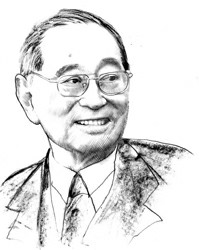|

Li Yining
|
Li Yining, born in 1930 in Yizheng, Jiangsu province, is a highly regarded economist who has been involved in China's economic reform process. He studied at Peking University from 1951 to 1955 and has been a professor at that institution since 1955. He also served as President of the university's Guanghua Management College. Li introduced the concept of joint-stock companies as part of strategies to reform the Chinese economy. The idea has been caught on and is widely practiced today in corporate restructuring.
When London hosted the first World Expo over 150 years ago, China had just suffered a disastrous defeat in the Opium War and was forced to sign an unequal treaty, ceding territories and paying indemnities under humiliating terms. By then, underpinned by eight decades of Industrial Revolution, Britain had become the first industrialized country in the world, and its ships were plying the waters of the world, including coastal and inland areas of China.
Since then, the world has undergone dramatic changes in politics and economics. China's international prestige and economic clout have steadily increased since the founding of the People's Republic of China in 1949 -- a peaceful progression that has captured the attention of the world. In May 2010, World Expo 2010 Shanghai China will open with great fanfare. Placed in the context of history since the Opium War, the Chinese people have reason to be proud of their motherland.
China's hosting of the World Expo exemplifies this unparalleled progress. Without the liberation of 1949, the economic reform and opening-up policies of recent decades and the undying hard work of all its people, China could have never achieved so much in so short a time. At the World Expo, we will be putting this splendid success story on exhibit for the whole world to see. We look forward to this opportunity with great pride.
World Expo 2010 Shanghai China will be a platform for promoting international communication and, for expanding the scope of the nation's integration with the rest of the world. World expositions have always served as windows for showcasing the uniqueness of host countries. The World Expo in Shanghai, which is already a metropolis of international reputation, will surely usher in a new stage for China’s development and for Shanghai's march toward the goal of becoming a global financial center. This exposition will bring an abundance of opportunities for business to expand internationally. It also will afford us the chance to learn from the experience of other countries in realms such as social and economic development, business management and applied application of technology.
The theme of World Expo 2010 Shanghai China is "Better City, Better Life," which perfectly complements our efforts of recent years to build a more harmonious society. “Better life” means that we should strive for quality of life in our economic growth, stressing the importance of jobs, education and other social services that affect daily lives. "Better life" exemplifies the principle of "people first" and the need to adopt sustainable approaches to development. Cities are the legacy of generations past and the hope of generations to come. Improving urban life requires innovation in determining how our cities look, in ensuring a clean environment and in enriching the spiritual life of residents.
Shanghai does not belong exclusively to local residents. Instead, it is deeply rooted in the nation as a whole and beckons the world at large. Improving life in Shanghai will be a role model for urban development across Chinese cities and, indeed, across the world.
Neither spiritual liberation nor independent innovation has any boundaries. To ensure a better urban life means that cities must embrace innovation, education and knowledge. The World Expo will mark a new starting line across these realms.
I sincerely wish World Expo 2010 Shanghai China every success.
As the host city for a milestone event with such an enlightening theme, Shanghai has shown its courage in addressing the challenges of future urban development and defining the global responsibilities of cities. It is my belief that through World Expo 2010, China will advance from the world factory of material production into an international cradle of civilization's promising future.

